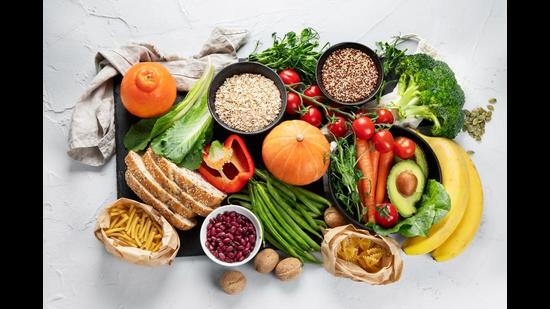Tackling PCOS with a balanced diet
Irregular and missed periods, excess body hair, including the chest, stomach, and back, weight gain, especially around the belly (abdomen), acne and oily skin are classic hallmark features of Polycystic Ovary Syndrome but they are only a part of the condition.
Irregular and missed periods, excess body hair, including the chest, stomach, and back, weight gain, especially around the belly (abdomen), acne and oily skin are classic hallmark features of Polycystic Ovary Syndrome but they are only a part of the condition.

Women with PCOS often have insulin resistance (the body does not use insulin well), resulting in too much insulin in the body. Insulin resistance is present in as many as 70% of women with PCOS regardless of weight and is a main contributing factor to these metabolic issues. The wrong kind of diet, one high in refined carbohydrates, can make insulin resistance, and therefore weight loss, more difficult to control.
“PCOS/ PCOD is due to imbalance of reproductive hormones, causing enlarged ovaries with small cysts on the outer edges. The cause of polycystic ovary syndrome isn’t well understood, but may involve a combination of genetic and environmental factors. PCOS/Pcod are reversible by making small changes in your diet and lifestyle,” says nutritionist Tripti Tandon.
“The main treatment approach for women suffering from pcos is nutrition intake and lifestyle changes. Maintaining healthy blood sugar and insulin levels are essential to managing PCOS,” adds Ritu Gupta, Head Nutrition Consultant, Nutrique by Ritu.
Processed and refined foods wreak havoc with hormone levels, so “clean” eating will actually help you begin to balance your hormones. As insulin, cortisol, testosterone, progesterone, estrogen, and the thyroid become more in balance, PCOS symptoms can be more controlled. “Have a balanced carbohydrate diet that is also rich in protein and fat to balance blood sugar levels,” says Tandon.

Balance carbs and proteins
Always combine a lean protein and complex carb at every meal/snack like a slice of turkey and a handful of nuts with a half of banana or yogurt with a small piece of cheese. “Consume complex carbohydrates- avoid sugar and refined food like chips and maida. Concentrate on complex carbs like rolled oats ,sorghum(jowar), ragi (finger millet), quinoa as they have plenty of fiber in them,” says Gupta.
Drink more water
Drink two liters of water per day, flavouring with cut-up fresh citrus, cucumber, mint or berries. “Maintaining hormonal imbalance is the key, and there are plenty of remedies mentioned in Ayurvedic texts - our medicinal roots,” says Shalini Santhanakrishnan, nutritionist at Kosmoderma Skin Hair Body Clinics. “Drink moonlight charged water in the morning- water kept in the moonlight overnight. It’s an ayurvedic remedy for PCOS”, she adds.
Eat healthy fats
“Include fats like desi ghee and nuts and seeds such as almonds, pumpkin seeds, walnuts, brazil nuts, flaxseeds and avoid refined oils completely,” says Gupta. Consuming fermented foods like kimchi, kombucha, sauerkraut will make for a healthy gut.
Focus on digestion
Santhankrishnan suggests eating unripe papaya (consume raw) after lunch or dinner ( avoid during periods) for better digestion.
Physical activity
Regular physical activity can help alleviate symptoms of PCOS. Get moving with at least 30 minutes of moderate-intensity physical activity most days of the week. “Regular exercise and movement throughout the day helps the body to burn sugar, lose fat and improve sensitivity to insulin,” adds Tandon.
Supplements
Zinc is an important supplement, it improves energy levels, helps with hair loss. Magnesium improves anxiety, fatigue controls, high blood pressure and improves sleep. Vitamin D boosts both bone health, reduces anxiety and depression, boosts immunity and B12 improves your mood and lowers inflammation.
Food to avoid
Refined carbs
Limiting carbohydrates, especially refined, nutrient-void carbohydrates, such as White bread, pizza dough, regular pasta and white rice can lead to weight loss, which in turn decreases androgen levels responsible for acne, abnormal hair growth, and anovulation, or an irregular menstrual cycle.
Sugary beverages
Stay away from concentrated sweets and sugars, like fruit juice—instead, choose natural sugars like fruits. Soda, fruit juices, bottled smoothies and cold-pressed juices are a big no-no if you are suffering from PCOS.
Processed foods
Foods such as cakes, candy, cookies, sweetened cereals, yogurts with added sugar, ice cream with excess added sugar or sugar substitutes contain harmful chemicals that are not only harmful for weight loss but can also destroy the gut microbiome. Instead of packaged foods, choose farm-to-table, whole foods.
Saturated and trans fats
Saturated fats like red and processed meats like fast food hamburgers and trans fats like doughnuts, French fries, frozen pizza are pro-inflammatory and should be avoid ed.
Catch your daily dose of Fashion, Taylor Swift, Health, Festivals, Travel, Relationship, Recipe and all the other Latest Lifestyle News on Hindustan Times Website and APPs.
Catch your daily dose of Fashion, Taylor Swift, Health, Festivals, Travel, Relationship, Recipe and all the other Latest Lifestyle News on Hindustan Times Website and APPs.





